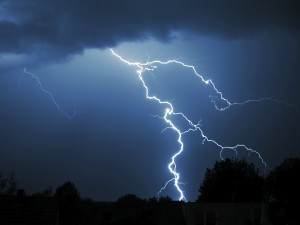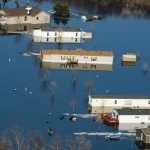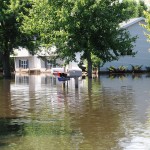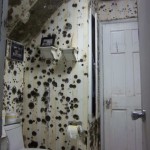Georgia Lightning Awareness Week: June 19-25, 2011
 Tuesday, May 17, 2011 at 04:17PM
Tuesday, May 17, 2011 at 04:17PM  Lightning is one of the leading causes of weather deaths in the United States. From 1995 to 2010, lightning caused 26 deaths in Georgia. Most lightning deaths occur in the summer months - usually in the afternoon and evening hours. Also, most deaths occur when people are caught outside during a storm.
Lightning is one of the leading causes of weather deaths in the United States. From 1995 to 2010, lightning caused 26 deaths in Georgia. Most lightning deaths occur in the summer months - usually in the afternoon and evening hours. Also, most deaths occur when people are caught outside during a storm.
Lightning results from the buildup and release of electrical energy between positive and negative charges between the earth and a thunderstorm. A single lightning bolt can be as hot as 50,000 degrees Fahrenheit - hotter even than the surface of the sun. This rapid heating and cooling of the air creates a shock wave which we hear as thunder. Lightning will usually strike the highest object in area. This includes trees, antennas, a boat on a lake, or a person standing in a field.
So, what should you do to protect yourself?
 Champion Construction Systems,
Champion Construction Systems,  Community News,
Community News,  Current Events,
Current Events,  Education,
Education,  Emergency Planning,
Emergency Planning,  Fire Damage,
Fire Damage,  Georgia,
Georgia,  Insurance,
Insurance,  Storm Damage,
Storm Damage,  Water Damage,
Water Damage,  atlanta,
atlanta,  atlanta ga,
atlanta ga,  champion construction,
champion construction,  disaster planning,
disaster planning,  disaster preparedness,
disaster preparedness,  georgia lightning awareness,
georgia lightning awareness,  georgia lightning awareness week,
georgia lightning awareness week,  lightning safety,
lightning safety,  lightning safety tips,
lightning safety tips,  newnan ga,
newnan ga,  north atlanta,
north atlanta,  sharpsburg
sharpsburg  Email Article
Email Article VACATION CHECKLIST: Things To Do Before You Leave
 Tuesday, May 17, 2011 at 03:43PM
Tuesday, May 17, 2011 at 03:43PM  It's summertime and that means vacations for most families. Unfortunately, your vacation buzz can be lost too quickly when you get home and realize that you forgot to take care of a few essentials. Your vacation should be an enjoyable and relaxing time, so before you head out here are a few things to be sure to check off your list so that you can come back to your home in the safe condition you left it.
It's summertime and that means vacations for most families. Unfortunately, your vacation buzz can be lost too quickly when you get home and realize that you forgot to take care of a few essentials. Your vacation should be an enjoyable and relaxing time, so before you head out here are a few things to be sure to check off your list so that you can come back to your home in the safe condition you left it.
-
Hold mail and newspapers.
-
Pay bills that will be due while gone.
-
Make arrangements for a neighbor or friend to have a key to your house or apartment - or at least know where one is. Give them a number where you can be reached.
-
Hold mail and newspapers.
-
Hurricane Season Predictions 2011
 Tuesday, May 17, 2011 at 02:59PM
Tuesday, May 17, 2011 at 02:59PM  Have you prepared an emergency plan for your family in case a natural disaster strikes your area. It's a fact that weather related disasters are on an increase in this country and throughout the world. The following is the current forecast for the upcoming hurricane season.
Have you prepared an emergency plan for your family in case a natural disaster strikes your area. It's a fact that weather related disasters are on an increase in this country and throughout the world. The following is the current forecast for the upcoming hurricane season.
Weather forecasting teams are predicting an active hurricane season for 2011, calling for an above-average number of storms to form in the Atlantic Hurricane Basin.
Earth Networks’ WeatherBug meteorology team foresees a lower number of expected hurricanes in comparison to 2010, but its numbers are still trending above what is considered to be a normal tropical storm season.
Specifically, Earth Networks expects a total of 13-14 named storms to form, with 7-8 becoming hurricanes. Of those, it expects four will become strong enough to be classified at “intense” storms—Category 3 or higher on the Saffir-Simpson scale.
 Champion Construction Systems,
Champion Construction Systems,  Community News,
Community News,  Current Events,
Current Events,  Emergency Planning,
Emergency Planning,  Gary Anderson,
Gary Anderson,  Storm Damage,
Storm Damage,  Water Damage,
Water Damage,  atlanta,
atlanta,  atlanta ga,
atlanta ga,  champion construction,
champion construction,  hurricane season,
hurricane season,  hurricane season 2011,
hurricane season 2011,  hurricane season predictions,
hurricane season predictions,  hurricanes 2011,
hurricanes 2011,  newnan ga,
newnan ga,  north atlanta,
north atlanta,  sharpsburg,
sharpsburg,  weather predictions 2011
weather predictions 2011  Email Article
Email Article More Vinegar Uses?
 Tuesday, May 3, 2011 at 08:34AM
Tuesday, May 3, 2011 at 08:34AM  One of my most vivid memories of childhood involves being at my grandmother’s house during the summer. My cousins and I would play outside as long as we could until we either got called inside or someone got hurt. The day of play finally arrived when I would be the one that ended play time due to my unfortunate run in with a gang of yellow jackets. After being attacked, I ran inside screaming for my mom like I had lost a limb. My grandma used the wisdom that had come from being the mother of 10 children and told my mom to get the salt shaker. She shook salt into her hand, added water to it and applied the mixture to my sting. The effect was immediate. My pain was relieved and it wasn’t long before I was able to go outside again and play.
One of my most vivid memories of childhood involves being at my grandmother’s house during the summer. My cousins and I would play outside as long as we could until we either got called inside or someone got hurt. The day of play finally arrived when I would be the one that ended play time due to my unfortunate run in with a gang of yellow jackets. After being attacked, I ran inside screaming for my mom like I had lost a limb. My grandma used the wisdom that had come from being the mother of 10 children and told my mom to get the salt shaker. She shook salt into her hand, added water to it and applied the mixture to my sting. The effect was immediate. My pain was relieved and it wasn’t long before I was able to go outside again and play.
Should I buy Earthquake Insurance?
 Tuesday, April 12, 2011 at 10:33AM
Tuesday, April 12, 2011 at 10:33AM  This following information is from United Policyholders:
This following information is from United Policyholders:Be Flood Ready This Spring!
 Tuesday, March 22, 2011 at 03:43PM
Tuesday, March 22, 2011 at 03:43PM  Here are some basic steps to take to prepare for spring rains:
Here are some basic steps to take to prepare for spring rains:
- Contact the local county geologist or county planning department to find out if your business is located in a flash-flood-prone area or landslide-prone area.
- Learn about your community's emergency plans, warning signals, evacuation routes, and locations of emergency shelters.
- Plan and practice a flood evacuation route with your employees. Post emergency phone numbers at every phone.
Mold, Moisture, and Your Home
 Thursday, February 24, 2011 at 03:32PM
Thursday, February 24, 2011 at 03:32PM - When water leaks or spills occur indoors - ACT QUICKLY. If wet or damp materials or areas are dried 24-48 hours after a leak or spill happens, in most cases mold will not grow.
- Clean and repair roof gutters regularly.
Prepare For Flood Season
 Thursday, February 24, 2011 at 03:01PM
Thursday, February 24, 2011 at 03:01PM  Educate Yourself
Educate Yourself
After getting flood insurance, there are several things you can do to minimize losses in your home and ensure your family's safety.
1. Safeguard your possessions.
Create a personal "flood file" containing information about all your possessions and keep it in a secure place, such as a safe deposit box or waterproof container. This file should have:
- A copy of your insurance policies with your agent's contact information.
Be Prepared for Hailstorms
 Monday, January 24, 2011 at 03:44PM
Monday, January 24, 2011 at 03:44PM
- Listen to weather updates about hail activity.
- Seek shelter immediately if you are caught outdoors - preferably not under a tree.
- Close drapes, blinds or window shades for protection
 Champion,
Champion,  Champion Construction Systems,
Champion Construction Systems,  Community News,
Community News,  Current Events,
Current Events,  Emergency Planning,
Emergency Planning,  Insurance,
Insurance,  Restoration,
Restoration,  Storm Damage,
Storm Damage,  Water Damage,
Water Damage,  atlanta,
atlanta,  atlanta ga,
atlanta ga,  champion construction,
champion construction,  customer service,
customer service,  disaster planning,
disaster planning,  disaster preparedness,
disaster preparedness,  hail damage,
hail damage,  hailstorms,
hailstorms,  newnan ga,
newnan ga,  sharpsburg,
sharpsburg,  tornado,
tornado,  tornadoes
tornadoes  Email Article
Email Article What to Do Before a Thunderstorm
 Monday, January 24, 2011 at 02:32PM
Monday, January 24, 2011 at 02:32PM Remove dead or rotting trees and branches that could fall and cause injury or damage during a severe thunderstorm.
If thunder roars, go indoors" because no place outside is safe when lightning is in the area. We want everyone to stay indoors until 30 minutes have passed after they hear the last clap of thunder.
Summary of Lightning Safety Tips for Inside the Home
- Avoid contact with corded phone.
- Avoid contact with electrical equipment or cords. If you plan to unplug any electronic equipment, do so well before the storm arrives.
- Avoid contact with plumbing. Do not wash your hands, do not take a shower, do not wash dishes, and do not do laundry.


